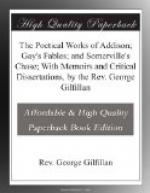For dignity composed and high exploit;
But all was false and hollow, though his tongue
Dropt manna, and could make the worse appear
The better reason, to perplex and dash
Maturest counsels.”
These two were the giants of the Tory confederacy of wits. But little inferior to them in brilliance, if vastly less in intellectual size, was Pope, with his epigrammatic style, his compact sense—like stimulating essence contained in small smelling bottles—his pungent personalities, his elegant glitter, and his splendid simulation of moral indignation and moral purpose. Less known, but more esteemed than any of them where he was known, was Dr Arbuthnot—a physician of skill, as some extant medical works prove—a man of science, and author of an “Essay on the Usefulness of Mathematical Learning”—a scholar, as evinced by his examination of Woodward’s “Account of the Deluge,” his treatise on “Ancient Coins and Medals,” and that on the “Altercation or Scolding of the Ancients”—a wit, whose grave irony, keen perception of the ridiculous, and magical power of turning the lead of learning into the most fine gold of humour, exhibited in his “Martinus Scriblerus,” his “Epitaph on the notorious Colonel Chartres,” and his “History of John Bull,” still extract shouts, screams, and tears of mirth from thousands who scarce know the author’s name—a politician without malice or self-seeking—and, best of all, a man without guile, and a Christian without cant. He, although a physician, was in effect the chaplain of the corps, and had enough to do in keeping them within due bounds; nay, is said on his deathbed to have called Pope to him, and given him serious advice in reference to the direction of his talents, and the restraint of his muse. Prior, though inferior to these, was no common man; and to learning, wit, and tale-telling power, added skill and energy in the conduct of public affairs. And last, (for Parnell, though beloved by this circle, could hardly be said to belong to it,) there was Gay, whom the others agreed to love and laugh at, who stood in much the same relation to the wits of Anne as Goldsmith did to those of George III., being at once their fool and their fondling; who, like Goldsmith, was
“In wit a man—simplicity a child;”
and who though he could not stab and sneer, and create new worlds more laughable than even this, like Swift, nor declaim and sap faith, like Bolingbroke, nor rhyme and glitter like Pope, nor discourse on medals and write comical “Pilgrims’ Progresses” like Arbuthnot, nor pour out floods of learning like Prior in “Alma,” could do things which they in their turn never equalled, (even as in Emerson’s poem, “The Mountain and the Squirrel,” the latter wisely remarks to the former—
“I cannot carry forests on my back,
But neither can you crack a nut,”)
could give a fabulous excellence to the construction and management of the “Fable;” extract interest from street crossings and scavengers, and let fly into the literary atmosphere an immortal Opera, the “Beggars’,” which, though feathered by the moultings of the very basest night-birds, has pursued a career of triumph ever since.




